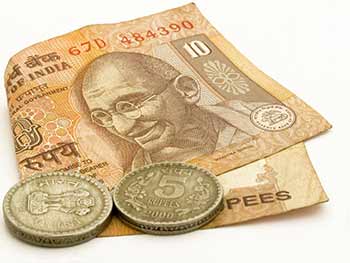
Having had nothing by way of significant domestic data the Pound Sterling to Indian Rupee exchange rate has softened on Tuesday.
The Pound Sterling to Indian Rupee exchange rate is currently trending in the region of 1000.2300.
With a lack of domestic data to gauge movement the Pound is still experiencing some of the losses from the end of last week. The dwindling economic standing of the Eurozone has contributed to the waning demand for Sterling. Although it doesn’t have much weighting both economically or as a market mover; Monday’s BBA Loans for House Purchase data compounded Sterling issues by posting below expectations.
Friday’s Indian domestic data printed reasonably positively. Year-on-year Deposit Growth increased by 13.9% compared with the 13.0% growth recorded previously. Foreign Reserves increased to 319.4 billion from the previous figure of 319.35 billion. However, Bank Loan Growth showed an increase of only 11.6% compared with the previous growth of 13.3%.
The Pound Sterling to Indian Rupee exchange rate has hit a high today of 100.4800.
On Tuesday morning the Pound to Indian Rupee exchange rate was trending in the region of 100.3683, but has since softened to around 100.2000. Given the lack of domestic data pertaining to either country the movement has been dictated either by geopolitical issues or as a result of foreign currency changes.
The current bid for Scottish Independence is throwing up increasing unknowns. That is to say the debate is still in full flow with no clear direction as yet. As a result of this Sterling has taken a hit as traders steer clear; opting instead for risk aversion strategies and the bullish US Dollar.
The Indian Rupee has shown to have had small gains on Tuesday as it tracks gains made in its Asian peers. The tepid Eurozone economy, failing French and Italian economies and increasingly poorer German economy has dampened desire for the Euro dramatically. As traders pull away from Euro many Asian currencies have benefited.
The Rupee, however, has benefited from tracking those Asian currencies bolstered by the fading Euro, as opposed to having the direct boost. This is the reason for the fractional gains rather than some of the larger gains seen by its Asian counterparts.
The Rupee hasn’t benefited directly primarily because of the Supreme Court’s ruling of the illegality of allocating coal blocks at the centre of a cronyism scandal. The decision on whether to reallocate the coal blocks or to enforce a penalty will take place on September 1st. Abhishek Vishnoi, writing for Reuters, explains the importance of that decision stating; ‘Analysts said a mass cancellation of the blocks would be a worst-case scenario and add to a shortage of coal for power plants. Coal is used to generate more than two-thirds of India’s electricity. Macquarie estimated, in a note, that complete de-allocation of the coal blocks would increase India’s import bill by $3 billion’.
The Pound Sterling to Indian Rupee exchange rate has hit a low today of 100.1100.
GBP to INR Exchange Rate Update
The recent scandal involving the illegal allocation of coal mining rights in India has seen investment in the Indian Rupee wane. The issue is in not knowing how the Indian Supreme Court will react. If they choose to punish the offending companies and a mass cancellation of the coal blocks occurs; the ramifications would be extremely detrimental.
The Pound Sterling has experienced some fractional gains as demand for the US Dollar dampens. It is unlikely, however, that the gap will widen considerably over the course of the rest of the week given the lack of influential market moving data.
Thursday’s Eurozone data may negatively affect Sterling as traders digest the less-than-impressive confidence data.

Comments are closed.